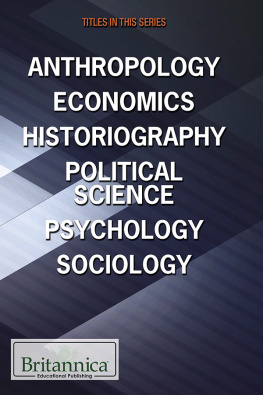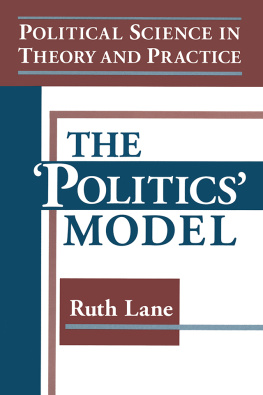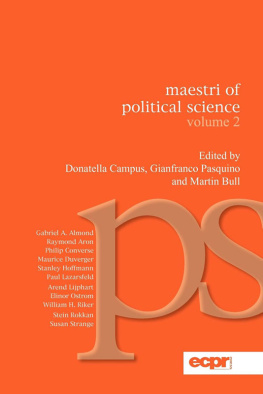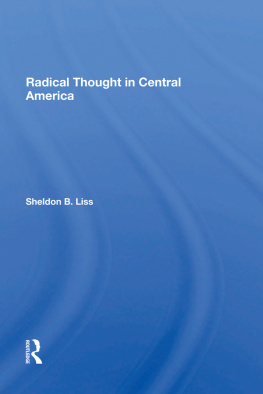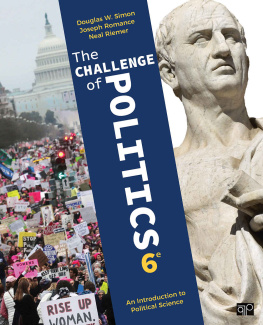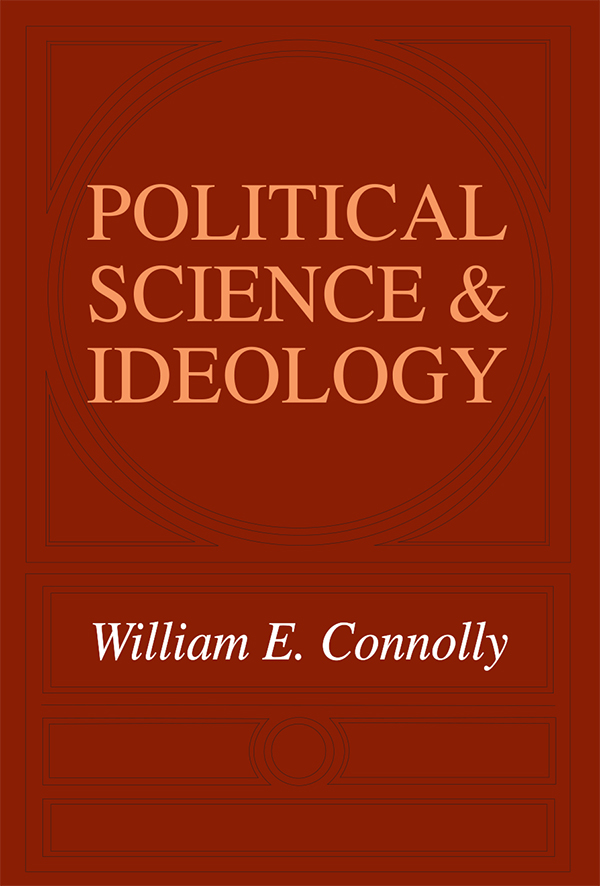Contents
Political Science & Ideology
Political Science & Ideology
William E. Connolly

First published 1967 by Transaction Publishers
Published 2017 by Routledge
2 Park Square, Milton Park, Abingdon, Oxon OX14 4RN
711 Third Avenue, New York, NY 10017, USA
Routledge is an imprint of the Taylor & Francis Group, an informa business
Copyright 1967 by Atherton Press.
All rights reserved. No part of this book may be reprinted or reproduced or utilised in any form or by any electronic, mechanical, or other means, now known or hereafter invented, including photocopying and recording, or in any information storage or retrieval system, without permission in writing from the publishers.
Notice:
Product or corporate names may be trademarks or registered trademarks, and are used only for identification and explanation without intent to infringe.
Library of Congress Catalog Number: 2006047491
Library of Congress Cataloging-in-Publication Data
Connolly, William E.
Political science and ideology / William E. Connolly.
p. cm.
Includes index.
ISBN 0-202-30851-0 (alk. paper)
1. Knowledge, Sociology of. 2. Ideology. 3. Political science. I. Title.
BD175.C6 2006
320.01dc22 2006047491
ISBN 13: 978-0-202-30851-7 (pbk)
Political scientists, in recent years, have paid remarkably little attention to the ideological aspects of their own research. This lack of attention suggests that they believe the ideological dimension has been largely eliminated from contemporary inquiry or, at least, that the progressive development of a science of politics promises to render that dimension obsolete in the foreseeable future.
I contend in this study that the ideological dimension retains central significance in contemporary political inquiry. Regardless of one's confidence or pessimism concerning the prospects for a future science of politics, the role of ideology in political analysis should receive serious intellectual attention today, The study itself represents one effort to expose and cope with the problem of ideology in political inquiry.
I am heavily indebted to several people who have contributed to this study. To my former mentor and present colleague James Meisel I am especially grateful. He has provided the stimulus for many of the ideas developed here and, of equal importance, has given me needed encouragement and support at every stage of this project. Arnold Kaufman also worked with me continually on this study; his pervasive impact on my thinking is only imperfectly expressed in the following pages. M. Kent Jennings, Roy Pierce, and David Kettler all read the entire manuscript and offered helpful comments and suggestions, many of which were incorporated in the final draft. It is a pleasure to acknowledge an intellectual debt to each of these men.
A final note of thanks is due to Miss Sue Pender-grass, who typed major portions of the manuscript, and to Miss Alyce Strickland, who helped arrange the index and competently handled many other procedural details.
Contents
When citizens, collectively or individually, as official agents or as private actors, make decisions having widespread public consequences, we hope that these decisions will be based on serious deliberation rather than upon thoughtless impulse, compulsive need, or careless guess. If a decision is in fact made after deliberation, an important component of the agent's considerations will have been his interpretation of the social and political environment.
Yet however deliberative he seeks to be, it is very likely that he will encounter in that environment many problematic situations which demand decision but in which information about key factors is unavailable or rests upon reasoned belief and conjecture rather than upon established knowledge. Decisions of public consequence are often required in situations of relative uncertainty, and this is when the problem of ideology becomes most severe and therefore most urgently demands serious intellectual confrontation.
As the term is here employed, an ideology is not itself a set of moral commitments or political ideals which are employed to judge events good or bad in the light of their consequences, although one's values do influence his selection of problems and they are psychologically linked to his ideological beliefs. Rather, in this study an ideology is an integrated set of beliefs about the social and political environment. It purports to tell us how the system is organized, which desired goals can be promoted, what agencies and channels can most effectively be employed to forward the goals in the given setting, and what the required action will cost various groups in the short and long run in terms of status, power, happiness, wealth, and so on. Diverging ideologies, of course, carry contrasting implications for political action. Hence the tasks of choosing among competing ideologies and of constructing a viable ideology become problems of major import for the careful student of politics.
If an ideology concerns itself with significant questions, then invariably it contains assumptions and beliefs which have not been reliably tested but are in some degree "accepted on faith." Thus, in situations of limited knowledge, ideologies fill the void of uncertainty with beliefs designed to direct and guide political activity.
Ideologies are essential to responsible decision-making in these conditions of limited empirical control. Yet in such conditions the ideological beliefs of the agent tend to reflect his predispositions to believe; he tends to construe the environment in ways that support the values, aspirations, and interests he brings to the empirical situation. In this sense, ideologies are "value-impregnated" systems of social and political belief. Important beliefs which cannot be tested in the given situation by well-designed empirical procedures are "tested" instead by ascertaining their degree of congruence with beliefs and values to which the adherents are already deeply committed. An ideology assimilates information in ways that preserve its basic integrity; it consists of a system of mutually reinforcing beMefs which appear plausible when viewed from within.
Herein resides the problem of ideology: A system of accepted political beliefs, often needed to orient political activity in problematic situations, also tends to be organized in ways which protect the higher level commitments of its supporters. In situations of limited empirical control it often becomes exceedingly difficult to ascertain whether the accepted ideology is effectively describing and explaining the political environment or whether its explanatory power is severely impaired by its tendency to obscure relevant but potentially disconcerting aspects of the environment from the consciousness of its supporters. A distorting ideology is unfortunate, for, once chosen, an ideology shapes and conditions the political behavior of its adherents.
Our broad purpose is to confront the problem of ideology in contemporary political inquiry. We are not primarily concerned with ideologies generated and supported by special interest groups in the society, although these overlapping and competing ideologies are relevant to our problem. Rather we consider the problem of ideology as it is expressed in the work of those whose training and location render them potentially best equipped to cope with the problem; accordingly, we focus on the work of representative political scientists. And we do not direct our attention primarily to those political interpretations with which we are in disagreement or to those which are known to be distorted because they have been definitively falsified by empirical tests. Our focus is the problem of ideology as it arises in the work of those political scientists who confront problematic situations which are not presently amenable to rigorous testing procedures at key points. The problem of ideology is confronted at bedrock level when we recognize that it is a problem for the political scientist as well as for the ordinary citizen, when we admit that our own political interpretations, as well as those of our opponents, contain ideological elements.








